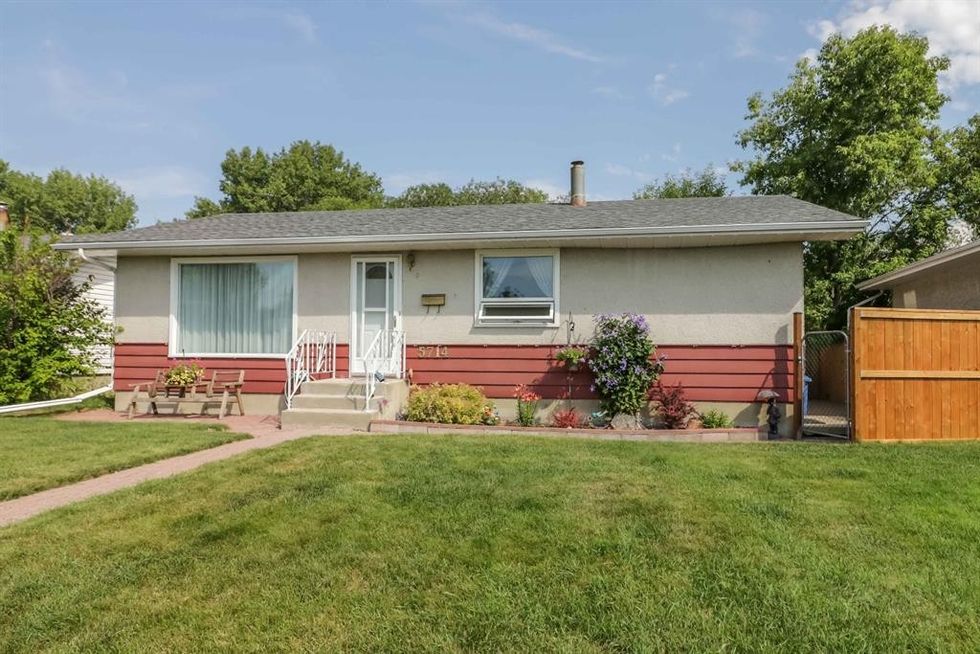Real eState
What It's Like to Live in Canada's Most Affordable Real Estate Market – Storeys
In a year where real estate prices have never been higher and millions of Canadians are struggling to afford a home, being able to say you live in Canada’s most affordable real estate market may draw some envious looks.
And according to the latest RE/MAX housing affordability report, that honour belongs to the residents of Red Deer, Alberta.
Located almost exactly halfway between Calgary and Edmonton, the third largest city in Alberta runs along both the north and south sides of the Red Deer River and boasts hundreds of acres of park land, quiet communities, and a downtown core that’s set to undergo a major revitalization. But perhaps most importantly, the city also boasts an average home price of $356,799.
Although it’s technically not the lowest-priced market that Canada has seen this year — Brandon, Manitoba and Regina, Saskatchewan both have lower average home prices — Red Deer residents tend to have higher household incomes, averaging $77,700 after taxes. This means a smaller percentage of the just over 100,000 residents’ income is spent on housing, thus making it a more affordable place to live than its Manitoba competitors.


One Red Deer resident, Candy Collins, moved to the Alberta city in April of this year along with her husband and daughter. Having come from Saint John, New Brunswick where more than half of their income was going towards rent, Collins says it feels like they “hit the jackpot” with Red Deer. For their pet-friendly two-bedroom, her family now pays $1,000 per month — $100 less than they were paying in Saint John — and her husband was able to find work earning two times the salary he was pulling in New Brunswick.
“The rent is cheaper, the gas is cheaper, groceries are the same or cheaper, and income has doubled,” Collins said. “It’s the best move we ever made.”
As with any city, Red Deer has its ups and downs. The area offers access to seemingly endless hiking trails and outdoor activities — Collins noted that her family was recently able to go camping together for the first time — and the friendly community feel is another big draw for those who move to, or chose to remain in, Red Deer. Many residents, however, lament the city’s crime rate, with some saying they avoid going downtown altogether. In a 2019 Maclean’s ranking of Canada’s most dangerous places, Red Deer ranked 10th for its Crime Severity Index — a measure of the severity level of police-report crime — and 37th for its overall level of crime.


But still, for many, the pros far outweigh the cons, especially when compared to the increasingly unaffordable markets that dominate much of Canada. Interior designer Kym Cole Wowk left one of those markets in Kelowna, British Columbia for Red Deer in June of this year. Wowk is currently looking to buy a home in the city but is renting in the meantime — and paying less than half of what her Kelowna landlord was charging.
“When we looked here in Red Deer we found a significant amount of properties that fit our criteria, but were nervous initially because we had heard that Red Deer had a crime issue and to stay away from certain areas,” Wowk said. “In talking to some people that lived here and following some groups on Facebook, we learned that Red Deer as a whole, described as bad crime, was nothing compared to what we had seen or experienced in Kelowna.”
A Price You Can’t Beat
It comes as no surprise that buyers coming from British Columbia or Ontario would find Red Deer’s home prices otherworldly. In Red Deer, it’s not uncommon to see detached houses — the most common type of housing there — listed for less than $300,000.
BC-native and now-Red-Deer-homeowner Raygan Solotki had been living in Inuvik, Northwest Territories before making the move to Alberta. She says that discovering she could buy a home somewhere more central was a pleasant surprise.
“I was looking for a place with a large backyard that was fenced for my dogs, at least three bedrooms as I work from home, and something under $300,000,” Solotki said. “Being from BC originally, I had sort of resigned myself to the fact I would be living up north forever, as house prices seem to be skyrocketing everywhere, so I didn’t think I could afford to buy in a city.”


Unlike pricier Canadian cities, Red Deer’s real estate market has remained more stable in recent months, experiencing much more muted highs and lows. As Dale Russell, broker and owner of RE/MAX Real Estate Central Alberta, explains, Red Deer’s market didn’t really see the pandemic boom that overtook Ontario and BC markets.
“We didn’t have anything like that until probably February or March of this year when we had a little bit,” Russell said. “There was some pent up demand as a result of COVID, and then we had people moving back to Alberta from Ontario and BC, selling their houses for big prices down there and coming back here and buying very affordable housing.”
But the rise didn’t push Red Deer’s real estate to new highs, Russell says. It essentially helped it recover from the dip that prices took from 2015 to 2019 when the price of oil dropped. Russell says that even in Red Deer, he still sees instances of buyers borrowing money from family for a down payment, or having their purchasing power shrunk by rising interest rates, but it’s nowhere near the levels seen in places like Ontario. And although the rental market is a bit competitive at the moment, finding a house to buy in Red Deer isn’t particularly hard.
More Time to Focus on Other Issues
Red Deer’s low real estate prices not only mean that it’s easier for people to own a home, but it takes a major issue off the City’s plate. Unlike municipalities in Ontario or BC, Red Deer’s City Council meetings aren’t dominated by discussions of how to address an affordable housing crisis.
“We don’t suffer from a very hot, almost completely speculative real estate market,” said Mayor Ken Johnston. “What we look at, as it relates to housing, is enabling our developers, working with our development community around reduction in red tape, and enabling them to move quicker.”


One of Johnston’s major projects is the revitalization of downtown. Residential development is a key part of this, along with addressing crime levels and bolstering local arts and culture communities. Johnston has lived in Red Deer for 26 years and has seen exactly how the downtown core has changed over the decades. A number of businesses have closed their doors and a growing homelessness issue has raised concerns for residents.
“Our [homeless] numbers themselves haven’t really risen dramatically, but what’s complicated [it is], and this is typical for most of us flyover cities, opioid addiction,” Johnston said. “It has really changed the landscape for a lot of cities and is much more difficult to deal with because, you know, people are simply not often clinically in a good place to be housed.”
The City operates seasonal shelters but is currently looking for a site to build a permanent one.
Johnston remains incredibly optimistic about the future of Red Deer, excitedly discussing the City’s work to create a new Vision 2040 statement that will build on Red Deer’s affordability, walkability, and trail network. He even hopes that Red Deer will earn a spot on the proposed Calgary to Edmonton high-speed rail line.
“That will have, I think, quite an impact on our housing market,” Johnston said. “We will have to very carefully weigh the benefits of being on a high speed rail versus the housing affordability that we offer people today.”
Real eState
Luxury Real Estate Prices Hit a Record High in the First Quarter
|
|

Luxury home prices have been rising at a steady pace, and so far this year, values have hit a fresh record high. According to a new Q1 report by the real estate site Redfin, the cost of luxury residential properties—those estimated to be in the top 5 percent of their respective metro area—rose by 9 percent compared to last year and increased twice as fast as non-luxury homes. At the same time, high-end abodes sold for a median price of $1.22 million in the first quarter, a new benchmark from the $1.17 million set in the fourth quarter of 2023.
“People with the means to buy high-end homes are jumping in now because they feel confident prices will continue to rise,” explained David Palmer, a Redfin Premier agent in the Seattle metro area, where the median sale price for luxury homes is a whopping $2.7 million. “They’re ready to buy with more optimism and less apprehension. It’s a similar sentiment on the selling side: prices continue to increase for high-end homes, so homeowners feel it’s a good time to cash in on their equity.”
More from Robb Report
To that point, the number of sales of luxury homes saw a 2.1 percent uptick from the year prior. In January, luxury sales began seeing consistent, year-over-year increases for the first time since August 2021. Another notable trend is that buyers are shelling out all-cash offers. Per the report, 46.8 percent of high-end residences purchased between January and March 2024 were paid for in cash, a staggering 44.1 percent gain from last year and the highest percentage in a decade.


Redfin found that Providence, Rhode Island, had the biggest jump in luxury prices in Q1, with values rising to $1.4 million, a steep 16.2 percent gain. Next was New Brunswick, New Jersey, where the median sale price bounced up 15 percent to $1.9 million. On the flip side, there were eight metros where luxury home prices dipped. Leading that pack was New York City, where prices dropped 9.9 percent to $3.25 million, followed by Austin, Texas, with a 6.9 percent decline.





Real eState
Montreal tenant forced to pay his landlord’s taxes offers advice to other renters
|
|
David Siscoe has some advice for fellow renters across the country: get proof that your landlord is paying their taxes, or at least make sure you’ve got a property manager who’s responsible.
Mr. Siscoe is the Montreal tenant who was audited and assessed by Canada Revenue Agency in 2018 and ordered to pay six years’ worth of his non-resident landlord’s withholding taxes, as reported recently by the Globe and Mail. Mr. Siscoe says he did not know his landlady was a non-resident.
He also didn’t know that tenants renting from a non-resident are required to withhold and remit 25 per cent of their rent to CRA each month, unless they have a property manager doing it for them, or if the non-resident has made alternate arrangements to pay their taxes.
“How is there no onus on the CRA to make sure that tenants are aware of this?” he asks. “I didn’t have a clue.”
The CRA had been unable to collect from his overseas landlord. He was then assessed for the unpaid withholding taxes, as well as compounded interest and penalties that added up to about $80,000, he says. In March, 2023, he took the Minister of National Revenue to Tax Court and lost.
Foreign landlord fails to pay taxes, CRA goes after tenant
The only break he was given was a reduction in the number of years he owed for, from six to three. He says he now owes around $43,000, although he believes more interest and penalties have since accrued. And he’s already paid nearly double that amount in accounting and legal fees.
Mr. Siscoe and his wife were paying nearly $3,000 a month in rent at 501-4175 Rue Sainte Catherine ouest, in Westmount, Que., an enclave of Montreal. Mr. Siscoe is a 1988 Canadian Olympic athlete and two-time taekwondo world champion who owns a gym.
The 61-year-old said he still hasn’t settled his debt with CRA, and his lawyer told him that it’s unlikely they’ll be willing to negotiate.
“They were acting like a dog on a bone,” he says of his initial communications with the tax agency. “They proceeded to suggest that we were knowingly paying a non-Canadian resident money, and I was a little flabbergasted.”
“I said, ‘You are trying to suggest I knowingly paid her 100 per cent of the rent because I wanted to be burdened with her tax implications? Is that what you are trying to suggest?’ I felt like this is a joke somehow.” Mr. Siscoe explained that he had rented unit 501 for more than 20 years, going back to 1996. He says that in 2010, the landlord told him to start making the rent payments to his sister. The new lease agreement had a Montreal address on it, and he hadn’t paid attention to the fact that the new landlady had signed the document in Italy, he says. Mr. Siscoe said she visited the apartment a few times over the years, and it was only after he got audited that he discovered she was living in Italy. After he realized he was on the hook for her tax bill, he and his wife and their kids moved out of the unit a few months later.
Mr. Siscoe did not want to share his landlady’s contact information for this story, on advice of counsel.
After the Siscoe family moved out, they learned that the former landlady had put the condo on the market, and Mr. Siscoe notified the CRA that they had an opportunity to collect the taxes she owed. He never found out if they tried.
In court documents, Mr. Siscoe argued that his landlord had given a Canadian address on the deed of sale when she purchased the unit; she had a Canadian social insurance number; and his rent cheques were going to a TD Canada account in Montreal.
Also in court documents, the CRA provided evidence that showed the landlord hadn’t filed income tax returns; she didn’t have any links to property in Canada other than the rental unit; her phone number on the lease was an Italian phone number; she had used an Italian e-mail address to correspond with Mr. Siscoe; and she had told the CRA auditor she lived in Italy.
The withholding tax has been around for decades. The problem for tenants arises when a non-resident landlord doesn’t pay it. And non-resident owned properties represent a substantial share of the secondary rental market in Canada.
Considering the risk to tenants – amid a housing crisis – Mr. Siscoe wonders why CRA didn’t put a lien against the rental property, or at least act to collect on the debt when the property sold.
Mr. Siscoe’s lawyer, Mr. Luu, says that all the CRA must do is establish liability to collect on the debt, and he said there doesn’t appear to be a guideline on how they do that.
“Whether the CRA could have collected the rent in some other way does not impact his liability under the law. The CRA and the Tax Court have to apply the law as it is written.
“That’s why if we want any meaningful change, we need to change the law and it’s for the Department of Finance to intervene.”
In an e-mail response, Caroline Theriault, deputy spokesperson and media relations manager for the Department of Finance, said that the requirement for renters helps to ensure that CRA obtains information on rental income non-residents might be earning in Canada. It also “helps facilitate collection of the resulting tax,” she said.
“This does not cost renters anything,” said Ms. Thériault, adding that it is standard practice.
A CRA spokesperson said in an e-mail that they encourage non-resident landlords to hire property managers. Otherwise, tenants are required to withhold the amount and fill out a Form NR4.
“If the non-resident fails to remit, the tenant is responsible for the full amount,” said the statement.
CRA’s practice is to “make every effort” to assess the non-resident owner rather than the individual tenant.
The agency pointed to a legal website that offered tips on ways renters can protect themselves, including a land title search on the landlord, asking the landlord for a certificate of residency, writing an indemnity clause into the lease agreement, and being on the lookout for any requests to redirect rent payment to someone else.
Adam Chambers, Conservative shadow Minister for National Revenue, which oversees the CRA, took issue with the policy and called the CRA’s reaction “cruel measures in the tax code that unfairly punish renters who have done no wrong.”
Real estate lawyer Ron Usher, who is general counsel for the Society of Notaries Public of B.C., where a non-resident owns one in 10 new condos, says that for every sale by a nontax resident, a clearance certificate from CRA must be obtained.
“Until CRA provides it, the notary will retain the amount in trust.”
To prevent Mr. Siscoe’s situation, he suggests a system whereby CRA is notified of any non-tax-resident real estate purchases. At that point, CRA would send the purchaser notice of tax obligations and issue an individual tax number if they don’t qualify for a social insurance number.
Mr. Siscoe said he is doing his best not to dwell on the situation. But he wants Canadian renters to beware.
“Don’t get me wrong. If me being angry could change the outcome, yes, I would be angry. But I’m not going to let them take more from me than they’ve taken,” he says.
“As an athlete, I spent my career travelling around the world, holding my country’s flag … but your own country can say, ‘Let’s screw him over.’”
He and his wife are renting another place, but it’s different this time.
“Right away I said [to the landlord], ‘I need to know you are paying your Canadian taxes, and I need it in writing.’”





Real eState
Judge Approves $418 Million Settlement That Will Change Real Estate Commissions
|
|


A settlement that will rewrite the way many real estate agents are paid in the United States has received preliminary approval from a federal judge.
On Tuesday morning, Judge Stephen R. Bough, a United States district judge, signed off on an agreement between the National Association of Realtors and home sellers who sued the real estate trade group over its longstanding rules on commissions to agents that they say forced them to pay excessive fees.
The agreement is still subject to a hearing for final court approval, which is expected to be held on Nov. 22. But that hearing is largely a formality, and Judge Bough’s action in U.S. District Court for the Western District of Missouri now paves the way for N.A.R. to begin implementing the sweeping rule changes required by the deal. The changes will likely go into full effect among brokerages across the country by Sept. 16.
N.A.R., in a statement from spokesman Mantill Williams, welcomed the settlement’s preliminary approval.
“It has always been N.A.R.’s goal to resolve this litigation in a way that preserves consumer choice and protects our members to the greatest extent possible,” he said in an email. “There are strong grounds for the court to approve this settlement because it is in the best interests of all parties and class members.”
N.A.R. reached the agreement in March to settle the lawsuit, and a series of similar claims, by making the changes and paying $418 million in damages. Months earlier, in October, a jury had reached a verdict that would have required the organization to pay at least $1.8 billion in damages, agreeing with homeowners who argued that N.A.R.’s rules on agent commissions forced them to pay excessive fees when they sold their property.
The group, which is based in Chicago and has 1.5 million members, has wielded immense influence over the real estate industry for more than a century. But home sellers in Missouri, whose lawsuit against N.A.R. and several brokerages was followed by multiple copycat claims, successfully argued that the group’s rule that a seller’s agent must make an offer of commission to a buyer’s agent led to inflated fees, and that another rule requiring agents to list homes on databases controlled by N.A.R. affiliates stifled competition.
By mandating that commission be split between agents for the seller and buyer, N.A.R., and brokerages who required their agents to be members of N.A.R., violated antitrust laws, according to the lawsuits. Such rules led to an industrywide standard commission that hovers near 6 percent, the lawsuits said. Now, agents will be essentially blocked from making those commission offers, a shift that will, some industry analysts say, lower commissions across the board and eventually force down home prices as a result.
Real estate agents are bracing for pain.
“We are concerned for buyers and potentially how we will get paid for working with buyers moving forward,” said Karen Pagel Guerndt, a Realtor in Duluth, Minn. “There’s a lot of ambiguity.”
The preliminary approval of the settlement comes as the Justice Department reopens its own investigation into the trade group. Earlier this month, the U.S. Court of Appeals for the District of Columbia overturned a lower-court ruling from 2023 that had quashed the Justice Department’s request for information from N.A.R. about broker commissions and how real estate listings are marketed. They now have the green light to scrutinize those fees and other N.A.R. rules that have long confounded consumers.
“This is the first step in bringing about the long awaited change,” said Michael Ketchmark, the lawyer who represented the home sellers in the main lawsuit. “Later this summer, N.A.R. will begin changing the way that homes are bought and sold in our country and this will eventually lead to billions of dollars and savings for homeowners.”
Under the settlement, homeowners who sold homes in the last seven years could be eligible for a small piece of a consolidated class-action payout. Depending on how many homeowners file claims by the deadline of May 9, 2025, that could mean tens of millions of Americans.





-



 Health22 hours ago
Health22 hours agoRemnants of bird flu virus found in pasteurized milk, FDA says
-
News18 hours ago
Amid concerns over ‘collateral damage’ Trudeau, Freeland defend capital gains tax change
-
Art22 hours ago
Random: We’re In Awe of Metaphor: ReFantazio’s Box Art
-
Art16 hours ago
The unmissable events taking place during London’s Digital Art Week
-



 Politics20 hours ago
Politics20 hours agoHow Michael Cohen and Trump went from friends to foes
-
Science21 hours ago
NASA hears from Voyager 1, the most distant spacecraft from Earth, after months of quiet
-
Tech23 hours ago
Surprise Apple Event Hints at First New iPads in Years
-
Media22 hours ago
Vaughn Palmer: B.C. premier gives social media giants another chance





